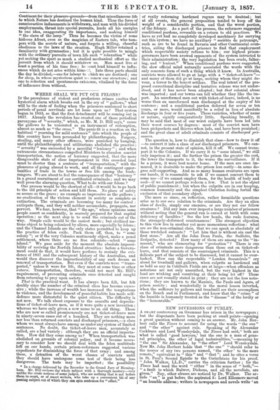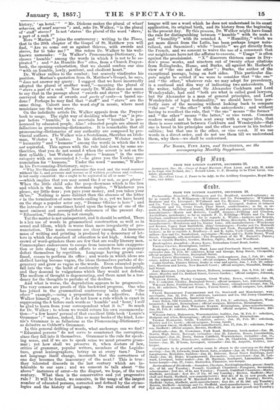NEW DIVERSIONS OF PURLEY.
A SMMIT controversy on Grammar has arisen in the newspapers ; but the disputants have been pecking at small points—opening a great question without coming to an answer. Mr. John Herbert calls the Times to account for using the words "the one" and "the other" against rule. Speaking of Sir Alexander Cockburn and Lord Wensleydale, the Times had said," both are what is called good lawyers,' but the one is a man of general principles, the other of legal technicalities,"—meaning by "the one" Sir Alexander, by "the other" Lord Wensleydale. Now Mr. John Herbert holds that "the one" "should refer to the nearer of any two persons named, the other' to the more remote," equivalent to " this " and " that "; and he cites a verse in St. Paul's Second Epistle to the Corinthians for his proof. "John Walker, LL.D.," carries the criticism further ; for the Times had used the word " either" in the sense of " both,"— " a fault to which Bulwer, Dickens, and all the novelists, are given." Nay, other abuses are noticed by Dr. Walker. The article " an " is _put before the aspirated h: Lord Ellesmere moved "an humble a&ress ; writ= in newspapers and novels write 'an history' 'an hotel.' " "Mr. Dickens makes the plural of wharf wharves, of scarf scarves"; and, asks Dr. Walker, "is the plural of staff' staves? Is not 'staves' the plural of the word stave,' a part of a cask ?" Here " Marian " joins the controversy ; writing to the Times, that in the 20th chapter of the Gospel of St. Matthew you will find, "Are ye come out as against thieves, with swords and staves, for to take me ? " She refers Dr. Walker to his wellknown namesake: "In Walker's Pronouncing-Dictionary, he classes 'humble' among the words in which Is is not to be aspirated " ; and "An Humble Bee" cites, from a Church Prayerbook, the opening exhortation, that we should confess our sins "with an humble, lowly, penitent, and obedient heart." Dr. Walker rallies to the combat; but scarcely vindicates his position. Marian's quotation from St. Matthew's Gospel, he says, "does not answer my query : I suggest that we have incorrectly adopted the plural of another word,"-meaning the plural of "stave a part of a cask." Now surely Dr. Walker does not mean to say that in the passage about "swords and staves" the writer conveyed the sense of swords and parts of casks-a barrel undone? Perhaps he may find that "staff" and " stave " are the same thing. Calcott uses the word staf in music, where most musicians use the word stave.
On the indefinite article Dr. Walker appeals from the Prayerbook to usage. The right way of deciding whether " an " is proper before "humble," is to ascertain how " humble " is pronounced by educated people. Alas ! educated people are almost as fallacious as pronouncing-dictionaries. It is remarkable that all pronouncing-dictionaries of any authority are composed by provincial authors. The Walker was a Scotchman, Sheridan an Irishman, Webster a Yankee. In his dictionary Webster ranks " humanity " and " humane " among the words in which the is is not aspirated. This agrees with the rule laid down by some authorities, that you do not sound Is when the accent is not on the first syllable ; but Webster also places "human" in the same category with an unsounded is f-he gives you the Yankee pronunciation for "humans." Under the word. "assume," Walker in his Pronouncing-Dictionary, says "Why Mre Sheridan should pronounce this word and the word consume without the h, and presume and resume as if written prezhoont and rezhoom, is not easily conceived : the a ought to be aspirated in all or none " -which implies that you may sound the is or not, as you please ! When the little child asks the peep-showman which is the lion and which is the man, the showman replies, "Whichever you please, my little dear ; you pays your money, and you takes your ch'ice." Nothing is more distinct than the absence of the letter r in the termination of some words ending in a, yet we have heard on the stage a popular actor say, " Donnar Oliviar is here " ; and the intrusive r is sometimes heard upon the tongue of one of the most eminent and accomplished statesmen of the present day. "Education," therefore, is not enough. Yet the matter is not unimportant, and it should be settled. There is a lax use of words in grammatical construction as well as in sound and idiom, which is worse than mere irregularity of pronunciation. The main reasons are clear enough. An immense mass of writing and printing is produced by a democracy of letters in which the standard of education is not high. Among the crowd of word-grinders there are few that are really literary men. Commonplace endeavours to escape from tameness into exaggeration or into slang ; but such efforts to snatch force or piquancy defeat themselves by repetition. Language having grown confused, ceases to perform its office ; and words in which ideas are clothed having become vague, the ideas themselves partake of degeneracy and grow as vague as the words. Even educated people fall into the vice; the habit of conformity draws them insensibly, and they descend to vulgarisms which they would not defend. The medium of thought is degenerating, and there must be a tendencyfor the thoughts to partake of the decline. And what is worse, the degradation appears to be progressive. The very censors are proofs of this backward progress. One who has joined in the grammatical controversy talks about "the above" example,-using a preposition for an adjective. John Walker himself says, "As I do not know a rule which is exact in suppressing the h before such words as 'humble' and hour,' I will be glad to learn from your correspondent what it is." So much for Dr. Walker ; to whom we would return his own recommendation-" a few hours' perusal of that excellent little book ' Lennie's Grammar ' ; " unless, indeed, like so many books of the kind, Lennie's Grammar is as fallacious as the Pronouncing-Dictionaryas delusive as Cobbett's Grammar.
In this general drifting of words, what anchorage can we find ? "Educated persons" do not serve to counteract the corruption, since they fall into it themselves. Grammar is the rule for speaking sense, and if we are to speak sense we must preserve grammar; yet how shall we preserve it, when doctors of law, critics of grammar, popular writers, members of the Legislature, great lexicographers, betray us at every turn? Does not language itself change, insomuch that the correctness of one day becomes the inaccuracy of the next ? This is true : they tolerated discords in the last century which are intolerable to our ears ; and we consent to talk about "the above" instances of error-to the disgust, we hope, of the next century. What then is the conservative and yet progressive rule ? It will be found, we conceive, in the usage of the largest number of educated persons, corrected and defined by the etymologies and the history of lang.uage. No real student of our
tongue will use a word which he does not understand in its exact application, its original birth, and its history from the beginning to the present day. By this process, Dr. Walker might have found the rule for distinguishing between " humble " with its mute is and "humility" with its sounded h. "Humility," which we get more direct from the Latin, has been perhaps longer naturalized, and Saxonized ; while " humble " we get directly from the French, and we consent to waive the use of a consonant that our neighbours have not the afflatus to execute. " Usage " is often against the precisionist. "X" discovers thirteen cases in Dryden's prose works, and nineteen out of twenty other citations from Bolingbroke, Hume, and Burke, all against Mr. Herbert's view of "the one and the other " ; Burke, the author of the exceptional passage, being on both sides. This particular dispute might be settled if we were to consider that "the one" and "the other," whatever rule we may adopt for precedency, is a confused and dim way of indicating two antecedents. If the writer, talking about Sir Alexander Cockburn and Lord Wenslcysdale, had said "both are what is called good lawyers, but Sir Alexander is a man of general principles, and Lord Wensleydale of legal technicality," we should have been perfectly sure of the meaning without looking back to compare "the one" or "the other" with the antecedents ; and without having to recollect the rule, that "the one" means "the former" and "the other" means "the latter," or vice versa. Common readers would not be then sent away with a vague idea, that there is some contrast between Cockburn and Wensleydale-that one is broad in his principles and the other narrow in his technicalities; but that one is the other, or vice versa. If we use words in a direct order, and do not use them till we understand them, why then-we shall be understood.
For BOOKS, FINE ARTS, and STATISTICS, see the accompanying Monthly Supplement.

































 Previous page
Previous page